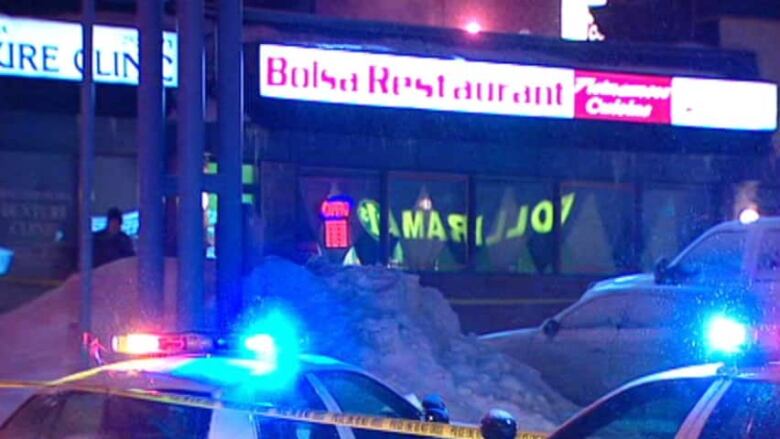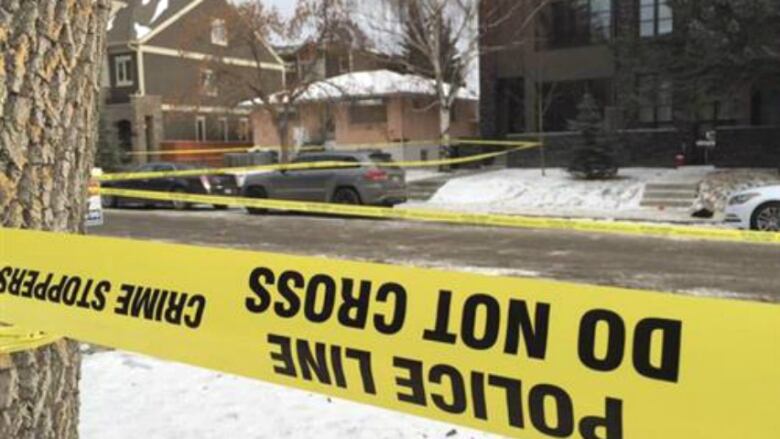Calgary gang war forces police, prosecutors to change tactics
Top challenges include uncooperative victims, frequent bail and danger to officers

Three months afterMohammedRafiemade a frantic 911 call to say his cousinwas shooting at him from a moving vehicle, he showed up in a Calgary courtroom to support hisalleged attacker'srelease.
The judge couldn't containhis outrage and orderedRafieout of court after learning thatthe now uncooperative complainant was sitting with the family of theaccusedhis cousinTarekEl-Rafie.
The case perfectly highlights some key challenges faced by authorities trying to police and prosecute organized crime amid what they say is a full-out gang war on the city's streets.
Most of the time, the public never learns the details that emerge at bail hearings because they're covered by publication bans. But no such ban was sought in this case.
- Calgary's new gang war marked by close family ties, police say
- Calgary faces all-out gang war defined by impulsive gun violence
'Co-operation from witnesses is always difficult'
Rafie flat-out refused to help investigators after his initial call for help in August 2015, as prosecutor BobSigurdsontold the judge.
This refusal of alleged victims and witnesses to co-operate is one of the trickiest parts of prosecuting gang crimes, according to BrianHoltby, the head of the specializedprosecution servicea branch of Alberta Justice that handles gang prosecutions.

Often those people are involved in crimes themselves, he says,and even those who aren't are frequently too frightened of the gangsters.
"Obtaining co-operation from witnesses is always difficult in organized crime cases," said Holtby. "They're reluctant to go to the police, which creates a dangerous situation because they may take things into their own hands,which worsens the problem."
Gangsters' frequent bail 'frustrating' to police
There's also huge frustration among some members on the force over how the courts treat these gangsters.
One of the biggest hurdles is we are catching these guys, we are charging them withthe shootings and they're getting released.- Calgary police guns and gang unitdetective
"One of the biggest hurdles is we are catching these guys, we are charging them with the shootings and they're getting released," said one detective on the Calgary police guns and gangs unit whom the CBC has agreed not to name in order to protect his safety and ongoing investigations.
Police had been doing surveillance onEl-Rafiein the weeks following the shooting. In November, he was accused of fleeing from officers who pulled him over, according toSigurdson.
The next day,El-Rafiewas arrested at the Calgary airport trying to flee the country and fly to Lebanon.
Even though he faced a raft of charges when he appeared in court, the judge released El-Rafie on a $5,000 surety, althoughwith a number of conditions including a curfew and an order not to contact his cousin.
"As soon as we arrest him, he flees. The next day he tries to leave the country. And then he's released again on bail," said the detective. "It is frustrating."
Far fewer arrests in gun-related homicides
The difficulty in policing gang-related crimes is illustrated in the different arrest rates when it comes to gun-related homicides versus non-gun killings.
Calgary's currently on track to have a record number of shootings this year, with 94 so far compared to 50 in total last year. And police say most of the shootings seem tied to gang activities.

Though it's difficult to say definitively which homicides in 2015 were gang-related, one of the best ways to look at the numbers is by examining the deaths where a firearm was used.
Police have made arrests in 88 per cent or 14 of 16 of the non-gun homicides in the city this year.
But when it comes to the 15 gun homicides, the difference is shocking. Suspects have been charged in only four, or27 per cent of the killings. (In 2014 there were only two shooting-related homicides.)
Prosecution changed tactics after past gang war
But there are plenty of gang-related cases that do make it to court,and that's why police and specialized prosecutors are working closely together using lessons learned from the past.
Four gang prosecutors from Holtby's team at Alberta Justice are still dealing with the trials from the last gang war, which left 25 people dead as the FOB and FK gangs clashed between 2002 and 2009.

But they're trying to do things differently this time as they tackle an increasing number of stemming from the current gang war.
"If there's one overarching lesson we've learned, [it] is to try and deal with things as quickly as possible and try as much as possible to nip them in the bud instead of letting them linger," saidHoltby.
One of the toolsHoltbysays prosecutors have been using is to skip preliminary inquiries and send the accused straight to trial through direct indictments.
The guns and gangs unit has also taken another unusual step. They've handed a list of dozens of "high level" participants in the latest gang war to the special prosecutorsso they can handle any charges laid against those on the list.
And the special prosecutors are showing up in court every time for everyone on thewatchlist, no matter how big or small the charge. The goal? To try to keep more people in custody pending trial and get stricter release conditions imposed on those who get bail.
Policereorganizeto target gangs
The police have also tried to adapt their tactics using lessons learned during the FOB-FK gang war.
They say they're trying to use every means available simultaneously to keep the high-risk suspected gangsters from committing more crimes likeenforcing court orders such as curfews, non-contact orders and alcohol prohibitions as well as other measures like traffic safety act violations.

For example, if they see someone on the gangster watchlistwhocommits any possible infraction while under surveillance, they try to snatch them off the streets and charge them.
Almost as soon as he took power as the new Calgary police chief on Oct. 19,RogerChaffin committed early on to makingthe gang war a priority by reorganizing the entire service.
In the early days, police were bound by their existing roles within assigned units but Chaffin says he's restructured to provide full operations under one umbrella, with the guns and gangs team able to access an incredible amount of resources.
Police currently have five major gang-related operations and 85 smaller ones underway with more "in the queue," Chaffin says.
One operation alone has linked about 10 retaliatory shootings in the city in one month, according to sources speaking on the condition of anonymity.
"We're at the stage where we're trying to destabilize them," saidChaffin. "I don't think in a big city you ever completely end these things."
Officer safety concerns
Those suspected gangsters who are released on bail, or after serving sentences, pose another challenge for police investigations.
After being charged, an accused person is given his disclosure that's a file detailing the evidence police have gathered in their investigation that supports a criminal charge. When this happens, the accused learns how police investigated the case, including details about surveillance.

"They learn more about how the police do their business, they're smarter, they're more savvy, they're able to better evade us in the future," says the detective from the guns and gangs unit who asked not to be identified.
Police who are conducting surveillance on asuspectcan also be in physical danger because the gangsters are often armed and acutely aware they're being targeted by rivals.
"They fear the fact that [the gang members] may think it's a rival organized crime person trying to shoot them, so that does create some serious officer safety concerns," said the detective. "They've shown clearly that they have little to no regard about where they engage in violence."
The police chief is hugely concerned about public safety during the gang war,but also says worry over his officers' well-being keeps him up at night.
"We're worried about our members rolling up at one of these things andgetting hurt or killed," said Chaffin. "Those things really do keep you awake."
This is the third and final story inFamily Feuds: Calgary's New Gang War,a series that examines the gunviolence happening in the city.MeghanGrant is the courts and crime reporter for CBC Calgary.Read the previous stories in the series here:












_(720p).jpg)


 OFFICIAL HD MUSIC VIDEO.jpg)
.jpg)



























































































